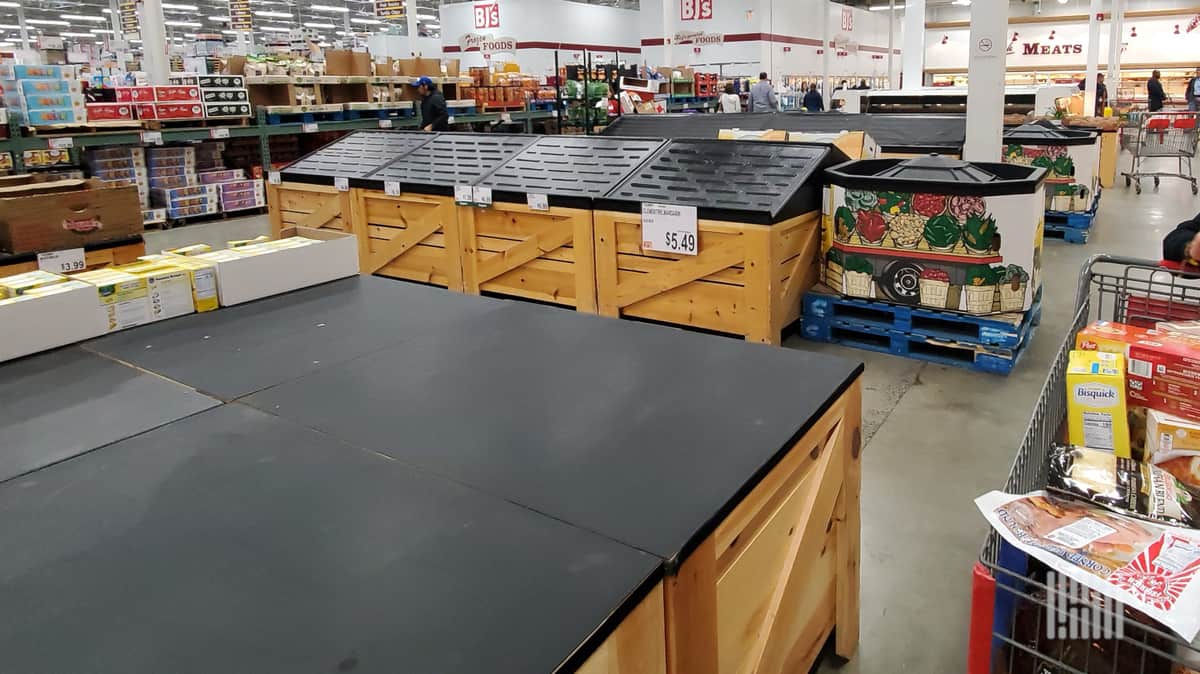Apple (NASDAQ: AAPL) announced today that it is closing all its retail stores outside China in response to the COVID-19 (coronavirus) pandemic. The company has about 500 stores globally and had previously shut its China stores during the outbreak in that country. Those stores reopened today.
The question now is, will other retailers follow suit and start closing locations?
“As of today, all of our stores in Greater China have reopened. I also want to thank our operations team and partners for their remarkable efforts to restore our supply chain. What we’ve learned together has helped us all develop the best practices that are assisting enormously in our global response,” Apple CEO Tim Cook said in a statement. “One of those lessons is that the most effective way to minimize risk of the virus’s transmission is to reduce density and maximize social distance. As rates of new infections continue to grow in other places, we’re taking additional steps to protect our team members and customers.”
Apple stores will remain closed until March 27. Its ecommerce operation will continue to operate, and all employees that can work remotely are being asked to do so. The company is also providing pay for all hourly workers as is operations were not disrupted, the statement said.
The National Retail Federation (NRF) sent out guidance on Friday urging governments to “refrain from blanket recommendations or mandates to close retail business across all sectors as ‘non-essential.’”
While retail sales have boomed for some retailers, especially grocery, large big-box retailers, and wholesale clubs, others have seen a drop in foot traffic. The National Retail Federation (NRF) said it has been in contact with the federal government and is ready to assist as needed.
“We know the effects of this virus are impacting millions of people, directly and indirectly, in the U.S. and around the world,” Matthew Shay, president and CEO of NRF said in a statement. “Retail brands are always on the frontline with citizens in communities large and small, and they are partnering with the health care industry and government officials to ensure COVID-19 is contained and mitigated as quickly as possible. Retailers are grateful for the opportunity to play such an important role and look forward to continued collaboration on the municipal, state and federal levels.”
Consumers have been buying out essentials at stores nationwide as panic buying takes hold. That has led to issues restocking shelves either due to lack of product, or lack of trucking capacity to move the product.
The second part of the issue is being addressed by the Federal Motor Carrier Safety Administration (FMCSA). On Friday night, FMCSA issued a 50-state waiver for hours-of-service compliance for commercial drivers transporting goods related to COVID-19. Those goods include:
Equipment and supplies related to the emergency restocking of stores
Supplies and equipment, including masks, gloves, hand sanitizer, soap and disinfectants, necessary for healthcare worker, patient and community safety, sanitation, and prevention of COVID-19 spread in communities
Persons designated as “necessary for the establishment and management of temporary housing and quarantine facilities; those “designated by federal, state or local authorities for transport for medical, isolation or quarantine purposes”; and “personnel to provide medical or other emergency services.”
As to whether more businesses will follow Apple’s lead, NRF said it is up to retail business owners to determine the best course of action for their businesses.
“NRF believes that retail business owners are in the best position to determine whether their individual stores should remain open or close. Retailers also intend to fully comply with government instructions,” the guidance said. “However, clarity and certainty is needed so that businesses may plan appropriately and consumers remain confident in their availability to access groceries, home and auto supplies, pet services, farm and agriculture equipment and livestock feed, and basic home health needs for children, adults and pets.”
NRF added that it would encourage local governments to provide as much advance notice as possible.
“Advance notice and specific details are necessary to avoid causing disruption from consumers overwhelming stores and exhausting available supplies quickly. It will also enable retailers to prepare their supply chains to handle customer needs both before and after mandatory store closing orders from the government,” it said.
Many states are limiting size of gatherings to 250 or fewer people. Movie theater chain AMC Theatres said it would not close its theatres, but it would limit audiences to half the size of the theater’s capacity. To date, no major retailers have issued similar proclamations, but local businesses and restaurants in some communities are limiting the number of people in their businesses.
When President Donald Trump announced a national emergency on Friday, he did so alongside the CEOs of major retailers Walmart (NYSE: WMT), Target (NYSE: TGT), Walgreens (NASDAQ: WBA) and CVS Health (NYSE: CVS) among others.
“These are extraordinary times that call for extraordinary measures,” Richard Ashworth, Walgreens president, said. “Collaboration with health officials, the government, and across our industry and other sectors is critical at this time. Walgreens has a long history of being there when our customers and communities needs us most.”
On Saturday, Trump said the government is considering some domestic travel restrictions, but it is unclear what impact, or any, that would have on the movement of goods.
Earlier this week, Walmart said it was working to replenish store supplies as quickly as possible, including diverting deliveries to areas in more immediate need.
“It should come as a surprise to no one that the U.S. government has reached out to the retail industry for assistance in this time of crisis. Our retail leaders stand at the ready to react and respond to help ensure the security and safety of employees and consumers alike in the communities they serve,” Shay said.











ehaqaavaav
mwbowqvpveffjkagjkctqdmtozmoye
hwbamdrzjk
zudjgnxttrcnyolaflgnoqtxrrbsht